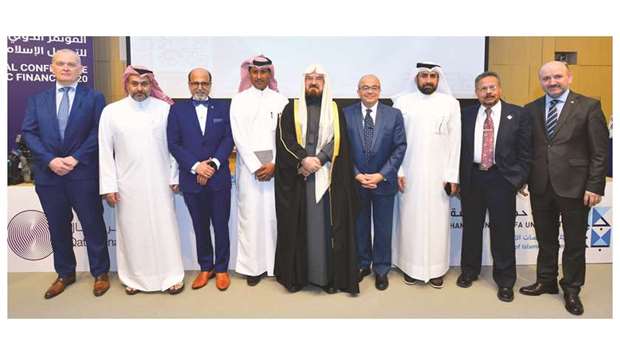Islamic banks specialising in specific sectors could help bring more international companies to the country, Qatar Financial Centre (QFC) CEO Yousuf Mohamed al-Jaida said during the ‘International Conference on Islamic Finance’ held yesterday at Hamad Bin Khalifa University’s (HBKU) College of Islamic Studies.
In a keynote address, al-Jaida said, “Indeed, more miles should be crossed to unlock further potential of this industry, one of which is to enhance the growth of the Islamic banking sector by making it a strategic government priority, supported by initiatives and incentives, such as relaxed banking provisions, which have been implemented in Turkey.
“Establishing specialised Islamic banks focused on areas like energy, sustainable investment, and venture capital are anticipated to even attract more international business to Qatar.”
Citing QFC’s recently-published report, ‘Unlocking Cross-Border Opportunities’, al-Jaida said that globally, Islamic finance assets are forecast to be worth $3.2tn in 2020.
Al-Jaida said that despite relatively slow growth rate expected this year compared to the significant uptick of 10% in 2017, the Islamic finance industry “is poised to bolster in specific markets, including Malaysia, Indonesia, Turkey, in addition to Qatar, as stated by the S&P Global Rating.”
“In fact, Qatar’s total Islamic finance assets constitute 33% of the nation’s total financial system assets. This has been driven by a CAGR growth of 8% since 2015 to $129bn in the first half of 2019.
“You may have witnessed the steady moves that have been made over the past couple of years to further expand this industry’s activity. To name a few, the outstanding performance of the $1bn takaful sector, which outpaced conventional insurance, mainly driven by Qatari insurance operators,” he said, adding that the successful merger of IBQ and Barwa Bank created more solid Islamic finance-based institutions.
“Let us not forget the first Islamic exchange traded fund (ETF), managed by Al Rayan Investment, which is the largest ETF not just in Qatar but in the GCC, making our nation one of just nine jurisdictions to have so far made this Islamic ETFS,” he continued.
Al-Jaida stressed that some of QFC’s endeavours include collaboration with Malaysia and Turkey to establish Islamic finance hubs, through the signing MoUs that would attract Turkish and Malaysian Islamic finance institutions to expand their networks and operations into the region.
“Expanding our network and ties with distinguished international institutions, such as the Islamic Financial Services Board (IFSB), is one of our vehicles supporting this plan. Becoming an associate member of the IFSB in September 2019 allowed access to their technical assistance and international best practices in implementing our prudential standards for Islamic finance institutions,” he said.
The conference, which concludes today (February 6), carries the theme ‘Circular Economy: Towards Impactful, Sustainable, and Value-based Intermediation. Other keynote speakers at the event were Dr Emad el-Din Shahin, interim provost at HBKU and dean, College of Islamic Studies; Dr R Seetharaman, Group CEO Doha Bank; Dr Marc Vermeersch, executive director, QEERI – Qatar Environment and Energy Research Institute, Qatar Foundation; Dr Mehmet Bulut, rector, Istanbul Sabahettin Zaim University Istanbul, Turkey; and Professor Ali al-Quradaghi, secretary general of Muslim Scholars Union, Qatar.

QFC CEO Yousuf Mohamed al-Jaida with Emad el-Din Shahin, interim provost at HBKU and dean, College of Islamic Studies; Dr R Seetharaman, Group CEO Doha Bank; Dr Marc Vermeersch, executive director, Qatar Environment and Energy Research Institute, Qatar Foundation; Dr Mehmet Bulut, rector, Istanbul Sabahettin Zaim University Istanbul; Professor Ali al-Quradaghi, secretary general of Muslim Scholars Union, Qatar; and Hassan Jummah al-Mohannadi, assistant undersecretary for Environmental Affairs, Ministry of Municipality and Environment; at the ‘International Conference on Islamic Finance’ held at the HBKU College of Islamic Studies yesterday. PICTURE: Ram Chand

